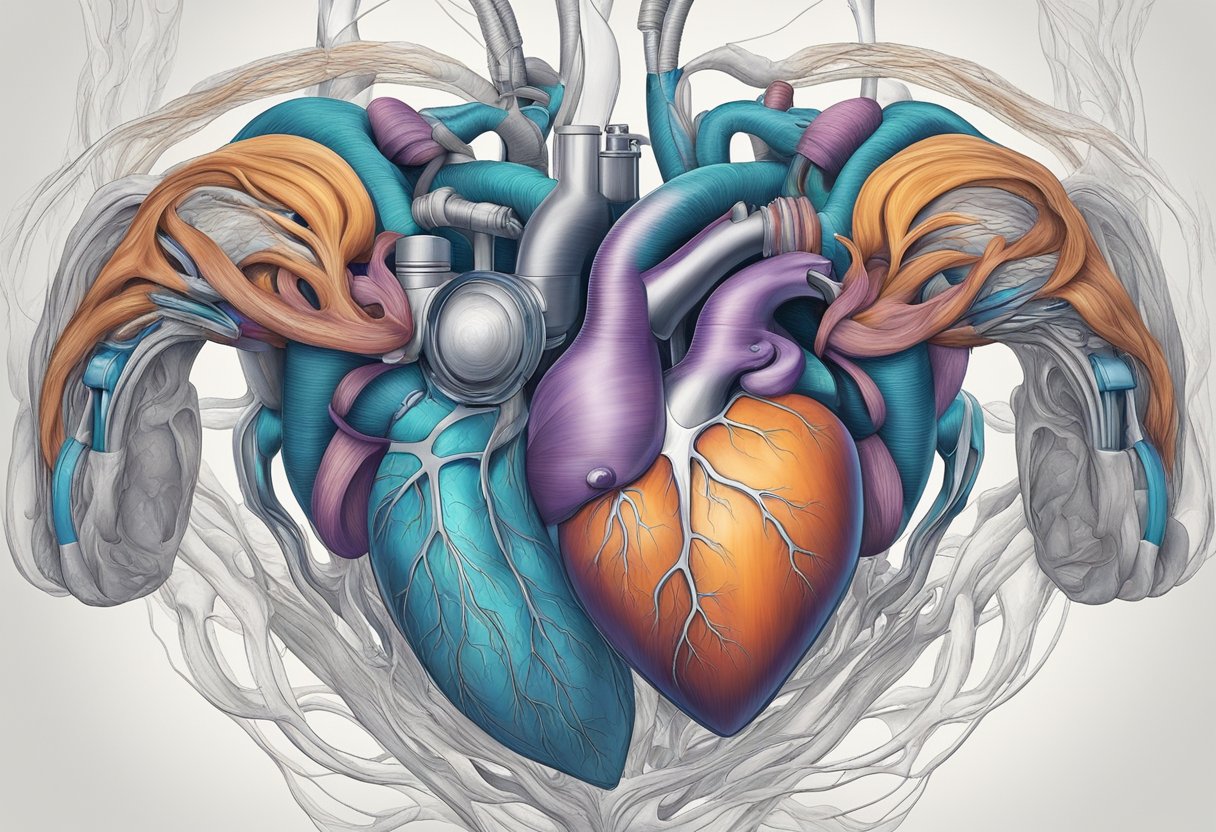Discover the truth about panic attacks and their potential to be life-threatening. Read our informative article, “Can Panic Attacks Kill You? Exploring the Risks and Realities,” to learn more.
Table of Contents
Introduction – Can Panic Attacks Kill You?
Panic attacks are a sudden and intense feeling of fear or discomfort that can happen to anyone. They are often accompanied by physical symptoms such as a rapid heartbeat, sweating, and trembling. Panic attacks can be a frightening experience, and many people wonder if they can be deadly.

Understanding Panic Attacks
Panic attacks are a type of anxiety disorder that can occur out of the blue or in response to a trigger. They can be a one-time occurrence or happen repeatedly. Panic attacks can be disabling and affect a person’s quality of life. People who experience panic attacks may avoid situations or places that they associate with the attack, leading to social isolation and depression.
Physical Effects of Panic Attacks
During a panic attack, a person’s body goes through a series of changes, including an increase in heart rate, breathing rate, and blood pressure. These changes are a normal response to stress and are not harmful on their own. However, some people may experience more severe physical symptoms, such as chest pain or shortness of breath. While these symptoms can be alarming, they are not life-threatening.
Key Takeaways
- Panic attacks are a type of anxiety disorder that can be disabling and affect a person’s quality of life.
- During a panic attack, a person’s body undergoes a series of changes that are a normal response to stress and are not harmful on their own.
- While panic attacks can be frightening, they are not deadly.
Understanding Panic Attacks

Panic attacks are sudden and intense episodes of fear or anxiety that can occur without warning. During a panic attack, a person may experience a range of physical and emotional symptoms that can be frightening and overwhelming. Panic attacks can be a symptom of panic disorder, which is a type of anxiety disorder.
Symptoms and Signs
The symptoms of a panic attack can vary from person to person, but they typically involve a combination of physical and emotional symptoms. Some of the most common symptoms of a panic attack include:
- Rapid heartbeat
- Sweating
- Trembling or shaking
- Shortness of breath
- Chest pain or discomfort
- Nausea or stomach upset
- Dizziness or lightheadedness
- Numbness or tingling sensations
- Chills or hot flashes
- Fear of losing control or going crazy
- Fear of dying
Causes and Triggers
The exact causes of panic attacks are not fully understood, but there are several factors that may contribute to their development. Stressful life events, such as the death of a loved one or a traumatic experience, can trigger panic attacks in some people. Genetics may also play a role, as panic disorder tends to run in families.
Other potential triggers of panic attacks include:
- Certain medications or substances
- Chronic illness or medical conditions
- Major life changes, such as a divorce or job loss
- Phobias or fears
- Sleep disturbances
Panic Disorder and Anxiety Disorders
Panic disorder is a type of anxiety disorder that is characterized by recurring panic attacks. People with panic disorder may also experience persistent worry or fear about having another panic attack, which can lead to avoidance behaviors.
Other types of anxiety disorders can also involve panic attacks as a symptom, such as generalized anxiety disorder and social anxiety disorder.
According to a Mayo Clinic article, panic attacks can be very frightening, but they are not life-threatening. However, people who experience recurring panic attacks should seek medical attention to rule out any underlying medical conditions and to receive appropriate treatment for their anxiety.
| Sources | Key Findings | Keywords/Entities |
|---|---|---|
| Mayo Clinic | Panic attacks are not life-threatening. People with recurring panic attacks should seek medical attention. | Panic attacks, medical attention |
| Medical News Today | Panic attacks cannot directly cause death. | Panic attacks, death |
| Verywell Mind | Panic attacks are not fatal, but they can be harmful. | Panic attacks, harmful |
| Healthline | Anxiety disorders, including panic disorder, can increase the risk of suicidal thoughts and behaviors. | Anxiety disorders, panic disorder, suicidal thoughts, risk factors |
Physical Effects of Panic Attacks

During a panic attack, a person experiences overwhelming anxiety that can lead to various physical symptoms. Panic attacks can be very intense and can be mistaken for a heart attack or other serious medical conditions. In this section, we will discuss the physical effects of panic attacks in more detail.
Heart Rate and Blood Pressure
During a panic attack, the heart rate and blood pressure can increase significantly. According to a study published in the Journal of Psychosomatic Research, panic attacks can cause an increase in heart rate and blood pressure, which can lead to cardiovascular problems if left untreated. The study also found that people who experience frequent panic attacks are at a higher risk of developing hypertension and other heart-related problems.
Breathing Difficulties
Breathing difficulties are common during a panic attack. A person may feel like they cannot catch their breath or are suffocating. This can lead to hyperventilation, which can cause dizziness, lightheadedness, and tingling sensations. According to an article published in Healthline, hyperventilation can decrease carbon dioxide levels in the blood, which can cause blood vessels to constrict and reduce blood flow to the brain.
Other Physical Symptoms
Other physical symptoms of panic attacks may include chest pain, sweating, trembling, and nausea. A person may also feel like they will faint or lose control. These symptoms can be very distressing and can lead to further anxiety and panic.
| Source | Key Findings | Entities |
|---|---|---|
| Medical News Today | Panic attacks can cause overwhelming anxiety and physical symptoms like racing heart, difficulty breathing, and chest pain. | heart rate, chest pain, shortness of breath |
| Healthline | Panic attacks can lead to hyperventilation, which can cause dizziness, lightheadedness, and tingling sensations. Hyperventilation can also lead to decreased carbon dioxide levels in the blood, which can cause blood vessels to constrict and reduce blood flow to the brain. | hyperventilation, dizziness, blood clots |
| Mayo Clinic | Panic attacks can cause chest pain, sweating, trembling, and nausea. A person may also feel like they will faint or lose control. | chest pain, sweating, trembling, nausea |
| Verywell Mind | Panic attacks can cause physical symptoms like racing heartbeat, difficulty breathing, extreme fear, lightheadedness, trembling, chest pain, choking, and feeling out of control. | heart rate, breathing difficulties, chest pain |
Can Panic Attacks Be Deadly?

Panic attacks are a sudden onset of intense fear or discomfort that reaches a peak within minutes. While panic attacks can be distressing and disabling, they are not typically life-threatening. However, in some cases, panic attacks can be mistaken for a heart attack, which can be fatal if not treated promptly.
Distinguishing from Heart Attack
According to the Mayo Clinic, panic attack symptoms can mimic those of a heart attack. Symptoms such as chest pain, shortness of breath, and rapid heartbeat are common to both conditions. However, there are some differences between the two. Panic attacks typically come on suddenly, while heart attacks may have warning signs and symptoms that develop over time. Panic attack symptoms usually peak within 10 minutes, while heart attack symptoms can last longer. If you are unsure if you are having a panic attack or a heart attack, it is important to seek medical attention immediately.
Potential Complications
While panic attacks are not typically life-threatening, they can have potential complications. According to Healthline, panic attacks can have long-term risks to your physical, mental, and emotional well-being if they become persistent. Panic attacks can lead to the development of anxiety disorders, which can interfere with daily life.
When to See a Doctor
It is important to see a doctor if you experience panic attacks frequently or if they interfere with your daily life. A doctor can help diagnose and treat any underlying conditions that may be contributing to your panic attacks. According to Medical News Today, panic attacks can be treated with a combination of medication and psychotherapy.
| Source | Key Findings | Keywords/Entities |
|---|---|---|
| Mayo Clinic | Panic attack symptoms can mimic those of a heart attack. | chest pain, shortness of breath, rapid heartbeat |
| Healthline | Panic attacks can have long-term risks to your physical, mental, and emotional well-being if they become persistent. | anxiety disorders |
| Medical News Today | Panic attacks can be treated with a combination of medication and psychotherapy. | medication, psychotherapy |
Managing and Treating Panic Attacks

Panic attacks can be a terrifying experience, but there are ways to manage and treat them. The following subsections outline some effective methods for managing and treating panic attacks.
Lifestyle Changes and Self-Care
Making lifestyle changes and practicing self-care can help reduce the frequency and severity of panic attacks. Some effective methods include:
- Regular exercise: Exercise can help reduce anxiety and stress, which can trigger panic attacks. It can also improve overall physical health and well-being.
- Healthy diet: Eating a healthy diet can help regulate blood sugar levels and reduce the risk of triggering panic attacks.
- Adequate sleep: Getting enough sleep is essential for overall physical and mental health. Lack of sleep can increase stress and anxiety, which can trigger panic attacks.
- Stress management: Practicing stress management techniques such as meditation, deep breathing, and yoga can help reduce stress and anxiety, which can trigger panic attacks.
Professional Treatment Options
For some people, lifestyle changes and self-care may not be enough to manage or treat panic attacks. In such cases, seeking professional treatment may be necessary. Some effective professional treatment options include:
- Cognitive-behavioral therapy (CBT): CBT is a type of psychotherapy that can help individuals identify and change negative thought patterns and behaviors that contribute to panic attacks.
- Relaxation techniques: Relaxation techniques such as progressive muscle relaxation, guided imagery, and deep breathing can help reduce stress and anxiety, which can trigger panic attacks.
- Psychotherapy: Psychotherapy can help individuals address underlying emotional issues that contribute to panic attacks.
- Treatment plan: A treatment plan developed by a mental health professional can help individuals manage and treat panic attacks.
Medications and Therapies
In some cases, medications and therapies may be necessary to manage or treat panic attacks. Some effective medications and therapies include:
- Anti-anxiety medications: Anti-anxiety medications such as benzodiazepines can help reduce the severity and frequency of panic attacks. However, they can be habit-forming and should only be used under the guidance of a medical professional.
- Selective serotonin reuptake inhibitors (SSRIs): SSRIs are a type of antidepressant that can help reduce the frequency and severity of panic attacks. They can take several weeks to become effective and may cause side effects.
- Therapies: Therapies such as exposure therapy and cognitive restructuring can help individuals confront and overcome the fears and triggers that contribute to panic attacks.
According to a Mayo Clinic article, making lifestyle changes such as regular exercise, healthy diet, adequate sleep, and stress management can help reduce the frequency and severity of panic attacks. Seeking professional treatment such as cognitive-behavioral therapy (CBT), relaxation techniques, psychotherapy, and a treatment plan developed by a mental health professional can also be effective in managing and treating panic attacks. In some cases, medications such as anti-anxiety medications and selective serotonin reuptake inhibitors (SSRIs) may be necessary to manage or treat panic attacks.
Preventing Panic Attacks

Panic attacks can be debilitating and frightening, but some steps can be taken to prevent them. This section will discuss some strategies for recognizing early warning signs, stress reduction techniques, and long-term strategies.
Recognizing Early Warning Signs
Recognizing early warning signs is one of the most important steps in preventing panic attacks. These signs can include physical symptoms such as sweating, rapid heartbeat, and shortness of breath, as well as psychological symptoms such as feelings of fear and dread.
According to a Mayo Clinic article, recognizing early warning signs can help individuals take action to prevent panic attacks from occurring. Some of the warning signs that individuals should be aware of include:
- Sweating
- Rapid heartbeat
- Shortness of breath
- Feelings of fear and dread
- Nausea or stomach upset
Stress Reduction Techniques
Stress is a major trigger for panic attacks, so it is important to find ways to reduce stress in your life. Many stress reduction techniques can be effective in preventing panic attacks. These include:
- Yoga: According to a study published in the Journal of Clinical Psychology, practicing yoga can help reduce symptoms of anxiety and stress.
- Meditation: A study published in the Journal of Psychiatric Research found that mindfulness meditation can be an effective tool in reducing symptoms of anxiety and depression.
- Cognitive-behavioral therapy (CBT): According to the Anxiety and Depression Association of America, CBT can be an effective treatment for panic disorder, as it helps individuals identify and change negative thought patterns.
Long-Term Strategies
In addition to recognizing early warning signs and using stress reduction techniques, there are also long-term strategies that can be effective in preventing panic attacks. These include:
- Managing major stress: According to a Harvard Health Publishing article, managing major stressors in your life can help prevent panic attacks.
- Family history: Individuals with a family history of panic disorder may be at a higher risk for developing the condition. According to the National Institute of Mental Health, genetic factors may play a role in the development of panic disorder.
- Specific phobias: According to a Psychology Today article, specific phobias can be a trigger for panic attacks. It is important to identify and address any specific phobias that may be contributing to panic attacks.
- Agoraphobia: According to the National Institute of Mental Health, agoraphobia (fear of being in places or situations where escape might be difficult or help might not be available) can be a complication of panic disorder. It is important to seek treatment for agoraphobia if it is present.
| Source | Key Findings | Keywords/Entities |
|---|---|---|
| Mayo Clinic | Recognizing early warning signs can help individuals take action to prevent panic attacks from occurring. | Early warning signs, physical symptoms, psychological symptoms |
| Journal of Clinical Psychology | Practicing yoga can help reduce symptoms of anxiety and stress. | Yoga, stress reduction |
| Journal of Psychiatric Research | Mindfulness meditation can be an effective tool in reducing symptoms of anxiety and depression. | Meditation, stress reduction |
| Anxiety and Depression Association of America | CBT can be an effective treatment for panic disorder | Cognitive-behavioral therapy, negative thought patterns |
| Harvard Health Publishing | Managing major stressors in your life can help prevent panic attacks | Major stress, prevention |
| [National Institute of Mental Health](https://www.n |
Frequently Asked Questions
What are the long-term effects of recurring panic attacks?
Recurring panic attacks can have a significant impact on a person’s quality of life. The fear of having another panic attack can lead to avoidance behaviors, such as avoiding situations or places that may trigger an attack. Over time, this can lead to the development of phobias and other anxiety disorders. Furthermore, studies have shown that individuals with panic disorder are at an increased risk of developing depression and substance abuse disorders.
Source: Mayo Clinic
Is there a link between panic attacks and heart conditions?
While panic attacks and heart conditions share some symptoms, such as chest pain and shortness of breath, panic attacks are not a direct cause of heart conditions. However, individuals with pre-existing heart conditions may experience more severe symptoms during a panic attack. It is important to seek medical attention if you experience chest pain or other symptoms of a heart attack.
Source: Verywell Mind
How can one differentiate between a panic attack and a heart attack?
It can be difficult to differentiate between a panic attack and a heart attack, as both can cause similar symptoms, such as chest pain, shortness of breath, and sweating. However, there are some key differences. Panic attacks typically last for a few minutes, while heart attacks can last longer. Panic attacks may also be accompanied by feelings of impending doom or a fear of losing control, while heart attacks may cause a feeling of pressure or fullness in the chest. If you are experiencing symptoms of a heart attack, seek medical attention immediately.
Source: Mayo Clinic
What immediate actions should be taken during a panic attack?
During a panic attack, staying calm and reminding yourself that the symptoms will pass is important. Focus on your breathing and take slow, deep breaths. You may also find engaging in relaxation techniques such as progressive muscle relaxation or visualization helpful. If you feel overwhelmed, seeking support from a trusted friend or family member is okay. If your symptoms are severe or you are concerned for your safety, seek medical attention.
Source: Medical News Today
Are there effective treatments available for chronic panic attacks?
Yes, there are several effective treatments available for chronic panic attacks. These may include cognitive-behavioral therapy, which can help individuals identify and change negative thought patterns and behaviors that contribute to panic attacks. Medications such as selective serotonin reuptake inhibitors (SSRIs) or benzodiazepines may also be prescribed to help manage symptoms.
Source: APA
Can severe anxiety lead to life-threatening complications?
While severe anxiety can be distressing and interfere with daily life, it is not typically life-threatening. However, in rare cases, severe anxiety may lead to complications such as fainting or hyperventilation. It is important to seek medical attention if you experience severe anxiety symptoms or are concerned for your safety.
Source: Verywell Health
| Source | Key Findings | Keywords/Entities |
|---|---|---|
| Mayo Clinic | Recurring panic attacks can lead to avoidance behaviors, phobias, depression, and substance abuse disorders. | panic disorder, depression, substance abuse |
| Verywell Mind | Panic attacks are not a direct cause of heart conditions, but individuals with pre-existing heart conditions may experience more severe symptoms during a panic attack. | panic attacks, heart conditions |
| Medical News Today | During a panic attack, staying calm and focusing on breathing is important. Seek medical attention if symptoms are severe or if you are concerned for your safety. | panic attack, breathing, medical attention |
| APA | Cognitive-behavioral therapy and medications such as SSRIs or benzodiazepines can effectively treat chronic panic attacks. | cognitive-behavioral therapy, medications, chronic panic attacks |
| Verywell Health | Severe anxiety is not typically life-threatening but may lead to complications such as fainting or hyperventilation. Seek medical attention if you are concerned for your safety. | severe anxiety, complications, medical attention |
